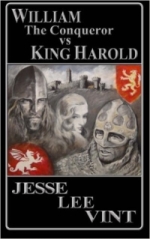Title: William the Conqueror vs King Harold
Author: Jesse Lee Vint
Publisher: Wolf’s Eye Publishing
ISBN: 9781507524138
Pages: 312
Genre: Historical Literature
Pacific Book Review
Brilliant interpretation of one of the most significant and sometimes overlooked battles in English history: The Battle of Hastings. This is not a dry historical rendering of who fought whom and how political power was exchanged. The history is here but has been given an Arthurian feel in landscape, style, and themes. This creative adaptation is therefore more entertaining and engrossing because it contains references and motifs of the grand epic style of medieval mythology. More directly, this is a character study of the battle’s two main players: William and Harold. Readers fond of works like Beowulf and The Lord of the Rings will find a similar nostalgia for medieval times in this work of historical fiction.Both Harold and William are humanized, the characters well drawn and multidimensional. William and Harold initially become friends and although they end up battling against each other, their mutual respect never escapes them. They both admire their ancestors, impressive leaders such as Alfred the Great. They are described as “warrior-kings,” a phrase that conjures the likes of Beowulf and the “warrior-poets” of Braveheart.
The author, Vint, takes some liberties which he discusses in the introduction: i.e. a Green Knight, a witch’s prophesy, and nods to King Arthur himself. These small-interspersed additions of intertextuality provide a more broad sense of English culture and a medieval life. Similar techniques are often used in film in order to include significant figures and themes of certain historical eras. With these techniques, the author has succeeded extremely well and begs the question if and when he might make another attempt to adapt this historical tale full of friendship, love, betrayal, myth, and war to the big screen.
This is a relatively unknown certainly to Americans event in English and French history. Some might know the date 1066, enough to guess correctly on a Jeopardy question, but little is covered even in British Literature Survey courses about William and Harold themselves. The Battle of Hastings had huge historical implications for “Angle-land” and would drastically change English culture and the language itself. This was the time of the transition from Norse to Christian mythology, the warrior-kings invoking any and all gods to support them in their righteous or sometimes greedy enterprises.
In the end, this is a tale told of nostalgia for the time of great warrior-kings. It invokes the Latin phrase and theme common to medieval poems such as Beowulf: “ubi sunt” short for ubi sunt qui ante no fuerunt – “Where are those who were before us?” Who were they? What inspired them? “William the Conqueror vs King Harold” is a great read. I recommend this book to anyone who loves a well-researched, historical novel.



Follow Us